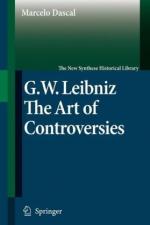|
This section contains 5,826 words (approx. 20 pages at 300 words per page) |

|
SOURCE: "On Leibniz's Explication of 'Necessary Truth'," in Leibniz: A Collection of Critical Essays, edited by Harry G. Frankfurt, Anchor Books, 1972, pp. 19-45.
In the following essay, originally published in German in 1966, Wilson examines Leibniz's concepts of necessary and contingent truths.
Leibniz's remarks on necessity are dominated by two primary themes. The first, of course, is the thesis that a necessary truth may be defined as a proposition which possesses, "implicitly" if not "expressly," a specific logical form. (This is sometimes referred to, in recent works, as the thesis that necessary truths are "analytic") The second is Leibniz's frequently reiterated contention that while the word "necessary" has application both to voluntary action and in connection with explanations of why the world is as it is, "necessary" as used in these contexts is not equatable with "logically necessary." It is with respect to these contexts that Leibniz speaks of...
|
This section contains 5,826 words (approx. 20 pages at 300 words per page) |

|


